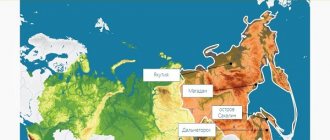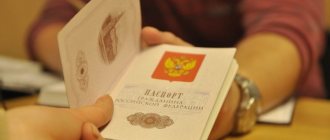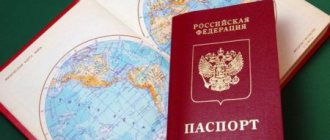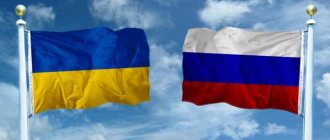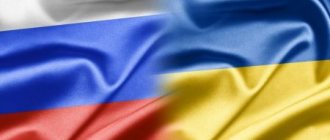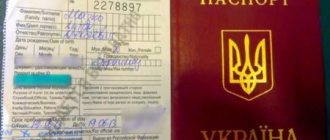Most European states are today trying to bring migration policy, including procedural measures for granting asylum to foreign citizens, to general rules. An additional impetus for such action today is the ongoing refugee crisis that has engulfed Europe in recent years. The vast majority of immigrants to the European continent are representatives of Asian and African countries, forced to flee war, poverty and lawlessness. In some cases, citizens of the countries of the former USSR choose this method of immigration to Europe: according to statistics, Ukrainians are more often than others trying to obtain asylum in the EU today. This desire is understandable, given the ongoing armed conflict in the southeast of the country and the deep economic and political crisis in the rest of the territory. What should an EU asylum seeker know?
Who is considered a refugee
According to Art. 1 Federal Law dated 02/19/1993 N 4528-1 (as amended on 12/22/2014) “On refugees”, they are considered either stateless persons who, as a result of a well-founded danger of becoming a victim of racial, religious, ethnic, political and other persecution specified in the law, are behind outside their country (or the country of their permanent residence) and cannot or do not want, due to such fears, to enjoy the protection of their state.
Refugee status in the Russian Federation can be obtained by foreigners and stateless persons who have arrived or wish to arrive in Russia, as well as those who are already legally or illegally in the country.
At the same time, Art. 2 of the Federal Law “On Refugees” defines a list of grounds upon which a person cannot be recognized as a refugee, which we will discuss below. In everyday understanding, refugees are also considered to be persons who move within the country or ask for refugees, which is wrong.
Status Program
There are some nuances that characterize the program that grants refugee status in the United States. There is no requirement to stay in the land of dreams - you can obtain refugee status by going through an interview with the immigration department at the United States Embassy.
As a resident or citizen of countries that are part of the CIS, you can obtain refugee status based on the US refugee program.
To move, you will need your affiliation with the Jewish nation, Evangelical Christianity, membership in the Catholic or autocephalous church of Ukraine.
Close relatives
The opportunity to obtain refugee status in the United States and subsequently go there is if you have close blood relatives among American citizens - they can be your guarantors. Those who can help you move include spouses, parents, adult children and grandchildren, and grandparents. Close relatives are also considered to be siblings over 21 years of age who have received migration status.
Rights and obligations of refugees in the Russian Federation
The peculiarities of the legal status of refugees and forced migrants in the Russian Federation are determined not only by the Federal Law “On Refugees”, but also by international documents: the Geneva Convention of July 28, 1951 and the New York Protocol relating to the status of refugees of January 31, 1967. These documents define the basic principles that the country's domestic legislation on refugees must adhere to, the minimum standards for the treatment of persons who have applied for help, and the basic rights that refugees can claim. The key provision of the documents is the ban on the expulsion of refugees and their .
Taking into account these standards, the international legal status of refugees is the basis for their legal stay in the territory of the country in which they received this status. In addition, among the main guaranteed articles. 8 of the Federal Law “On Refugees” rights include:
- the right to the services of an interpreter, explanation of the rights granted to the migrant and assistance in obtaining entry documents;
- the right to housing, food and use of utilities;
- the right to medical and drug coverage;
- the right to assistance in obtaining vocational education and;
- the right to social protection and security, including receiving social benefits;
- the right to apply for and obtain Russian citizenship in the manner prescribed by law;
- the right to voluntarily return to the country of one's previous residence
At the same time, the constitutional and legal status of refugees imposes on them a number of responsibilities:
- compliance with the legislation of the Russian Federation;
- compliance with the rules of residence in the provided residential premises;
- timely arrival at the migration authorities;
- completing re-registration with migration authorities within the time limits established by law;
- message about a change in personal data and place of stay.
Procedure for obtaining status
The stages of recognizing a person as a refugee are determined by the provisions of Art. 3 Federal Law “On Refugees”. According to it, a person wishing to obtain this status must:
- submit a corresponding petition;
- undergo a preliminary review procedure;
- obtain a decision to issue a certificate of consideration of the application;
- undergo consideration of the appeal on its merits;
- receive an appropriate decision and, if the result is positive, receive a refugee certificate.
Since the passage of these stages has many features, it is advisable to consider each of them in more detail.
Where to go
The decision to recognize a person as a refugee is made exclusively by the migration authority - at the moment this is the Main Directorate for Migration of the Ministry of Internal Affairs. However, according to Art. 4 of the Federal Law “On Refugees”, the corresponding application can be submitted by an interested person to:
- diplomatic or consular office of the Russian Federation - if the foreigner is located outside the state of his residence or outside the Russian Federation;
- border authorities when passing border control if the person is outside the Russian Federation;
- border authorities or migration control authorities within 24 hours if the person entered the territory of the Russian Federation illegally;
- to the territorial unit of the Main Directorate for Migration Affairs of the Ministry of Internal Affairs at the place of legal stay of the migrant in the territory of the Russian Federation.
Submitting an application
According to Part 1.1 of Art. 4 of the Federal Law “On Refugees”, a person wishing to obtain this status must submit an application for refugee status. It is submitted in the form of a petition in the form established by Appendix No. 3 to the Administrative Regulations, approved by Order of the Federal Migration Service No. 352 of August 19, 2013.
The petition must be submitted in writing and cannot be submitted as an electronic document.
This form must contain the personal data of the person submitting the petition, state of nationality, date and place of birth, a list of persons who arrived with the applicant and are under his guardianship or who have not reached the age of majority, as well as a request for recognition of refugee status.
Such a petition is accepted from each adult capable family member. It is filled out in Russian - if the person does not speak it, he is provided with an interpreter.
Acceptance and consideration of the application
According to paragraph 45 of the Administrative Regulations, applications are accepted on the day the person applying for refugee status applies. If he does not have documents, there is no translator, or for other reasons, the reception date may be postponed and must be agreed with the applicant.

Initially, the procedure for recognizing a person as a refugee provides for a preliminary consideration of his application. According to paragraph 79 of the Administrative Regulations, it is carried out within five days from the date of receipt by the migration authorities. During the preliminary review process, all documents are formed into a personal file.
During the preliminary consideration of the application, an authorized migration officer checks the information provided by the applicant, taking into account the internal political, sanitary and other situation in the country of citizenship of the applicant. In addition, the existence of circumstances giving the right to obtain status is determined, for which an employee of the Department of Internal Affairs of the Ministry of Internal Affairs issues appropriate requests.
Result of consideration
Based on the results of the preliminary examination, a decision is made on further consideration of the application or on refusal. If a positive decision is made within 24 hours, the applicant is issued a certificate of consideration of the application for refugee recognition. It is issued only to adults with legal capacity - information regarding minors and persons under guardianship is entered in the certificate of one of the parents or guardians.
This certificate is the basis for registration with the migration authorities and for sending its holders to a temporary stay center. Receipt of the certificate is the basis for consideration of the application on its merits.
Grounds for refusal
Migration authorities may refuse to consider the application on its merits. According to Art. 5 of the Federal Law “On Refugees”, the grounds for refusal may include circumstances confirming:
- initiation of a criminal case for a crime on the territory of Russia;
- receipt of an earlier refusal to consider the application on the merits due to the lack of circumstances necessary to grant status, if they have not yet changed;
- receiving a refusal to grant status from other countries that are members of the UN, if their legislation does not contradict the legislation of the Russian Federation;
- having citizenship of a third country and the ability to take advantage of its protection;
- arrival from the territory of another state in which a person could receive refugee status;
- absence of circumstances giving the right to obtain the status;
- illegal crossing of the border with the Russian Federation in order to obtain status and violation of the procedure established for this;
- refusal of a person to provide the necessary information;
- the applicant is married to a citizen of the Russian Federation, which gives the right to obtain a temporary residence permit;
- availability of a temporary residence permit in the Russian Federation.
The decision to refuse, indicating the reasons and motives, is sent to the migrant within three days after its issuance.
Appealing a refusal
A person who has received a refusal to consider a petition on its merits has the right to appeal it. The procedure for these actions must be explained to the applicant.
The refusal, according to paragraph 143 of the Administrative Regulations, can be appealed pre-trial by filing a complaint with higher migration authorities.
The appeal is carried out within a month from the date of receipt of the decision on refusal or within three months from the moment the applicant became aware of it.
Such a complaint must contain the name of the body whose decisions are being appealed, personal and contact information, information about the decisions being appealed and arguments that make such a decision illegal. The complaint is considered within 15 days from the date of its registration.
Based on the results of the consideration, the higher authority makes a decision to satisfy or partially satisfy the complaint or to refuse to satisfy it. The results of the review are sent to the applicant no later than the next day after the review.
In addition, the decision to refuse to consider the application, in accordance with paragraph 156 of the Administrative Regulations, can be appealed in court.
If the applicant does not use his right to appeal, in accordance with Part 4 of Art. 5 of the Federal Law “On Refugees”, within a month from the date of receipt of the refusal, he is obliged to leave the territory of the Russian Federation along with members of his family.
Package of documents
To successfully apply for refugee status in 2021, it is not enough to simply contact the migration authorities - you must also submit a number of documents. Thus, according to clause 24 of the Administrative Regulations, along with the application, applicants are required to submit identification documents for themselves and family members. If they are written in a foreign language, the documents must be translated into Russian.
Usually an identification document is sufficient, but the applicant has the right to submit any other documents and materials that support his request. The more documents a candidate submits, the greater the chance of a positive decision. All of them must be attached to the candidate’s personal file.
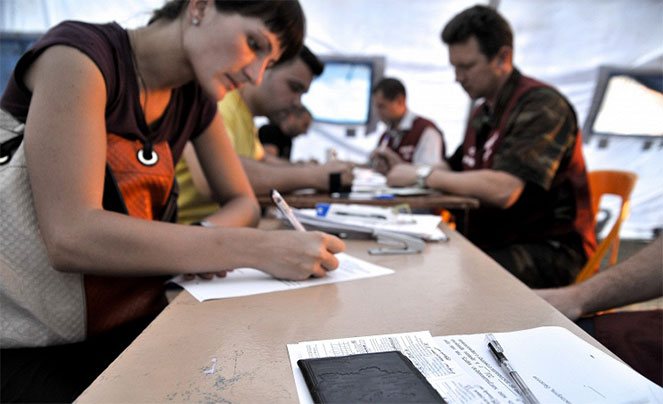
Lack of documents
The absence of identification documents of a person is not a basis for refusal to consider an application. If a migrant does not have such documents, he must explain the reason for their absence and provide any other identification documents other than a passport, as well as other documents with which he substantiates his request. In the absence of such papers, all necessary information is recorded from his words.
Subsequently, the person who decides to consider the application makes appropriate inquiries to the competent authorities in order to establish the identity of the refugee.
How does personal identification occur?
According to Part 3 of Art. 3 of the Federal Law “On Refugees”, on the day of submitting the application the applicant must undergo a personal identification procedure. It, according to paragraph 73 of the Administrative Regulations, provides for mandatory fingerprinting of the applicant, as well as photography, which are carried out by an authorized employee of the migration authorities. The results obtained are entered into the refugee’s personal file.
Medical examination
In accordance with clause 4, part 2, art. 6 of the Federal Law “On Refugees”, a person who applies for refugee status is required to undergo a medical examination. According to clause 40 of the Administrative Regulations, based on the results of such an examination, an appropriate certificate is issued.
Questionnaire and questionnaire
The peculiarities of the administrative and legal status of forced migrants and refugees, as already mentioned, require these persons not only to submit an application, but also to fill out a questionnaire and questionnaire, the form of which is approved by the Administrative Regulations. According to clause 30 of the Administrative Regulations, they are filled out from the words of the applicant in Russian by an authorized employee of the migration authorities. Data is entered into them based on the results of the survey and individual interview.
The preliminary questionnaire for determining refugee status contains biographical data of the applicant and circumstances indicating the reasons for his appeal and petition. In addition to information about the applicant, the questionnaire includes information about his family members, previous places of stay, identity documents, route and circumstances of arrival in the territory of the Russian Federation, facts of sending applications to international organizations and other countries, as well as other information. The form of the questionnaire must comply with Appendix No. 5 to the regulations.
After the survey, an individual interview is conducted with the applicant. Its results are entered into a questionnaire in the form approved by Appendix No. 6 to the regulations. In addition to information about the applicant, it records questions to the applicant regarding the reasons for his application, as well as answers to these questions.
At the end of the interview, the data entered into the questionnaires is read out to the applicant, and all inaccuracies and contradictions are clarified. To clarify the entered data, additional interviews may be conducted, the recording of which also requires filling out questionnaires.
The information included in these documents is subject to verification, based on the results of which a decision is made to consider the application on its merits.
Consideration of the application on its merits
According to. 7 of the Federal Law “On Refugees”, consideration of the application on its merits is carried out within 3 months if the person is on the territory of the Russian Federation, and within 2 months if outside it. Such consideration involves conducting additional interviews, a comprehensive study of the reasons and circumstances of the application, checking the accuracy of the information provided, and establishing the circumstances that give the right to obtain refugee status. In order to comprehensively study the circumstances, the above deadlines may be extended.
Based on the results of consideration of the application, the migration authorities make a decision on recognition as a refugee or on refusal of such recognition. The said decision is sent to the applicant within 3 days. If a positive decision is made, a certificate is issued for the refugee.
Refugee ID
A refugee certificate is issued to all persons in respect of whom a corresponding decision has been made and who have reached the age of majority. If a person has not reached the age of majority, but arrived in the territory of the Russian Federation without parents, he will also be issued a certificate. The document contains information about family members who have not reached the age of majority, as well as about those persons who are under guardianship. The form of the document is established by Decree of the Government of the Russian Federation No. 356 of May 10, 2011. The certificate is issued on paper and cannot be issued in the form of an electronic document. A copy of the document is attached to the personal file.
The certificate is a refugee’s identity document and is valid throughout the country. It is the basis for registration with the migration authorities. This document includes:
- personal data of a person recognized as a refugee;
- an indication of the documents that confirm his identity;
- photograph and fingerprint;
- gender, marital status and signature;
- date of issue and expiration date, as well as the name of the authority that issued it.
We recommend that you learn more about what privileges the owner receives.
Submission of national documents
According to Part 8 of Art. 7 of the Federal Law “On Refugees”, upon receipt of the certificate, a person recognized as a refugee surrenders his national passport and other documents that prove his identity. They remain in storage at the migration authorities.
Nuances of the interview
When filling out the forms, be extremely careful and serious, since these forms, in fact, become the most important documents that are considered, and on the basis of which you will be invited to the US Embassy. You won't have to pay for this. The interview itself, during which your acquisition of status is reviewed, is conducted at the American Embassy. Speaking of the interview, it is based on the interview that takes place at the immigration office when a person is granted political asylum.
There are some nuances that are worth paying special attention to. The fact is that both the person who wants to acquire the coveted status and his relatives, who fit the category of close family members, will be interviewed simultaneously, however, in different rooms. If your application for status is based on religious beliefs, make sure to bring documents, photographs and other evidence indicating your relationship to that religion.
Each completed form must be signed by you, even if you have used someone else's help to complete the forms for your question. Only you will be held criminally responsible for the accuracy of the information you provide.
Before you sign, take a breath and calmly re-read everything, check that everything is in order, because any inaccuracy can not only delay the consideration of your case, but also completely exclude the possibility of you receiving refugee status in the United States.
What questions to expect
Topics that may be covered include the documents you provide and the information you provide on the form. You should not expect communication in a friendly tone; on the contrary, you need to be mentally attuned to the interview, which is carried out in a rather harsh form. Do not forget that the official’s task is not to humiliate your human dignity.
You need to figure out whether you have the right to become a refugee in the United States. Due to the fact that a huge number of people born in the former USSR have already received this status. From year to year, Congress reduces the quota offered to those interested.
Simplified procedure for Ukrainians
Those who are interested in how to obtain refugee status in Russia for a Ukrainian citizen are counting on some simplified registration procedure, but this is wrong. In fact, the registration of this status by Ukrainians is absolutely no different from the registration of it by citizens of other countries.
In 2014, the State Duma of the Russian Federation considered a bill that proposed granting refugee status to Ukrainian citizens in an accelerated special procedure, but this document was rejected. Therefore, Ukrainians apply for refugee status in accordance with the general procedure. The simplified procedure is provided only for the provision of temporary asylum.
What refugee status in Russia gives to Ukrainians from the southeast is permission to stay in the Russian Federation and placement in a temporary stay center. The legal status of Ukrainian citizens on the territory of the Russian Federation has some preferences for them even without obtaining refugee status. In particular, Ukrainians have the right to stay on the territory of the Russian Federation for 90 days without additional permission, they are subject to special conditions for obtaining a temporary residence permit and residence permit, the right to work on the basis of a patent, as well as a simplified procedure for obtaining citizenship, including by state program to assist the resettlement of compatriots.
Where to begin
As you know, the law allows citizens of Ukraine to stay on the territory of the Russian Federation without registration for no more than 3 months from the date of crossing the border within each six months. If a longer period of stay on Russian soil is expected, then it is necessary to register with the nearest branch of the Main Directorate for Migration Affairs of the Ministry of Internal Affairs.
Most Ukrainians crossing the border today hope to obtain refugee status or temporary asylum in neighboring Russia, and for this they will definitely need to go through the registration procedure without waiting for the required 90 days to expire, since this is necessary for the preparation of many documents confirming refugee status.
There are three ways to submit your application:
- to the Russian representative office in Ukraine, while still in his homeland;
- while crossing the border at a checkpoint;
- at the place of arrival at the nearest migration service office.
If you crossed the border in a way that is not entirely legal, you need to contact the department of registration of foreign citizens no later than one day to legalize your stay.
Refugee registration
This status can be obtained by:
- Persons who cannot remain in their home country due to persecution on religious, racial, political or social grounds.
- Citizens whose country makes no attempt to protect its population.
- Persons suffering from persecution by government officials.
It is important to know that it will not be possible to obtain a residence permit in Russia if the said persecution is carried out for criminal or economic reasons.
Registration for refugees from Ukraine includes several stages. The first thing you need to do is to draw up a petition in which you should set out in detail the reasons that forced you to seek protection in another country. Together with your passport, migration card and photograph, this application is submitted to the registration authority.
Mandatory procedures include fingerprinting and medical examination. After the preparatory stage has been completed, the moment of the interview comes. Representatives of the migration service, a lawyer, and a translator, if needed, can attend.
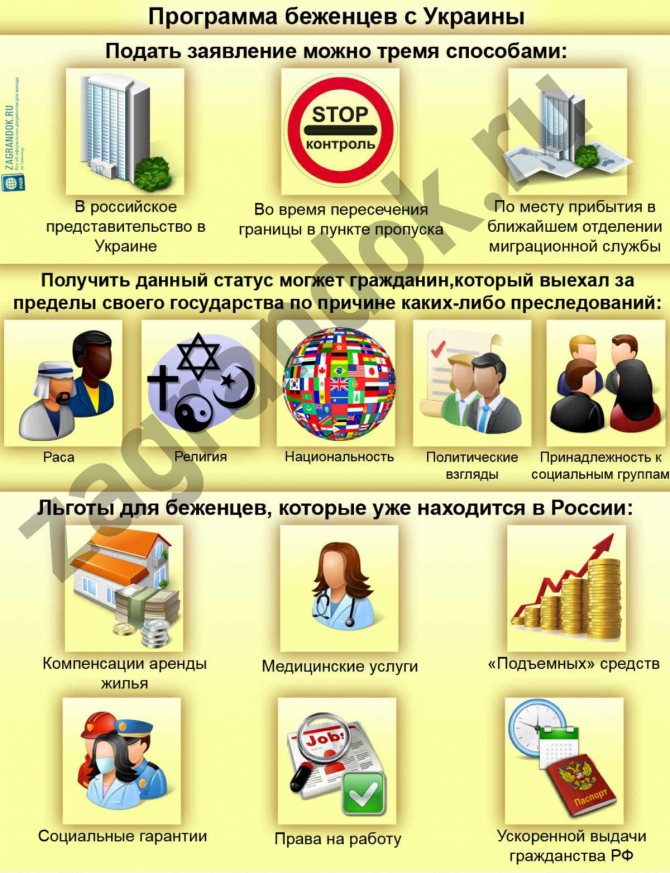
If the whole family submits documents, then the conversation will take place with each of its members. You need to know that children under 14 years of age can only be interviewed in the presence of their parents. Spouses may also remain in the room during the interview, but should not interfere in the conversation. By the way, the purpose of this conversation is to clarify in as much detail as possible all the circumstances that forced you to flee your country.
After this, consideration of the application will begin, which can last up to 3 months.
A positive outcome of the case assumes that you will then be given a certificate that will equalize your rights with other citizens of the Russian Federation, and will be escorted to your place of permanent residence for the period of refugeehood. At the place of arrival, you must register with the territorial office of the Main Directorate for Migration Affairs of the Ministry of Internal Affairs.
Please note that for the period of your stay in Russia as a refugee, your internal Ukrainian document will be confiscated and will be stored in the migration service department. Upon expiration of the refugee certificate, if the conditions that forced one to seek shelter in a neighboring country change, the Ukrainian passport will be issued back in exchange for the certificate.
Registration of refugee status in Moscow
The capital, due to its economic and social status, is one of the most attractive cities for refugees. However, due to the massive number of applications, not all applicants receive the desired status, and therefore legal problems arise in the implementation of refugee status in Moscow.
Those who apply to the Moscow migration authorities very often have to be refused registration due to the influx of applicants, the lack of human resources necessary to process them and the lack of places in temporary stay centers. Therefore, in order to successfully and quickly obtain refugee status, it is recommended to contact the regional departments of the Main Directorate for Migration Affairs of the Ministry of Internal Affairs and their territorial divisions.
Refugees
A person who is subject to bullying due to being a member of a nation, ethnic group or belonging to a society, a particular religion, or a political view that differs from the generally established one in the country has the opportunity to receive a positive response, referring to the United Nations Protocol.
If you want to obtain refugee status in the United States, then an unfounded desire will be too little - it’s a drop in the ocean.
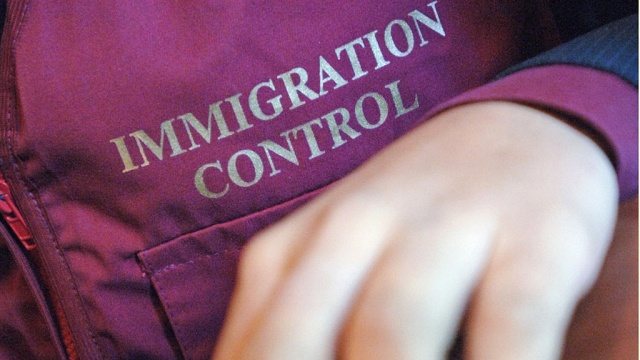
You should have sufficient legal grounds, and, in addition, relatives in America who could vouch for you. This direction of immigration has a large number of legal barriers and other subtleties.
Before going to the embassy to apply for U.S. refugee status, it is advisable to seek specialist approval by consulting with a lawyer. Thanks to this, you will not have to subsequently correct those annoying mistakes that could have been made during the process and that would prevent you from achieving a positive answer in solving your problem.
Status validity period
Contrary to the prevailing stereotype, refugee status is granted by migration authorities without specifying a period: it is valid until the refugee loses this status or is deprived of it. However, every year and a half, refugees are required to undergo re-registration, during which the issue of maintaining or losing their status is decided. Only the validity period of a refugee certificate, which is valid for three years, is considered limited.
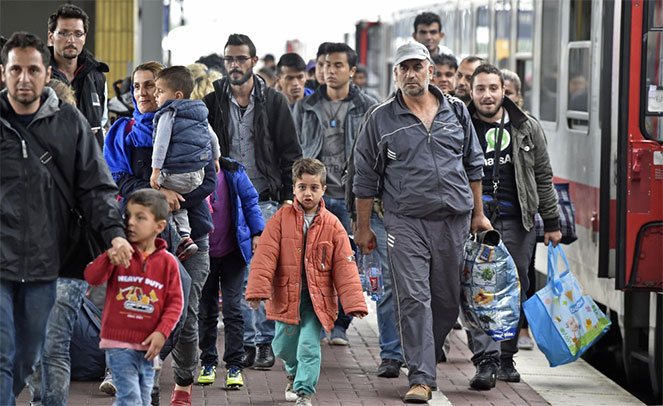
Reasons for denial of status
The main reason for refusal to grant refugee status is the lack of grounds for obtaining it, that is, the unfounded fear of becoming a victim of persecution and non-compliance with other criteria specified in paragraphs. 1 clause 1 art. 1 Federal Law “On Refugees”. In addition, refusal to grant status, according to Art. 2 of the Federal Law “On Refugees” can be imposed on persons:
- in respect of whom there are suspicions related to the commission of crimes against peace, humanity and war crimes;
- who committed serious crimes before arriving in the Russian Federation;
- not deprived of protection from the authorities of his country;
- who are already under UN protection;
- who left the country for economic reasons, due to hunger, or a man-made accident.
Loss and deprivation of status
The standards determining in which cases a person loses refugee status are established by Art. 9 Federal Law “On Refugees”. This happens when a refugee:
- or acquires Russian citizenship;
- voluntarily enjoys the protection of the state of his nationality;
- regains the citizenship he lost;
- acquires citizenship of another state and enjoys its protection;
- re-settled voluntarily in the state of his previous residence;
- can no longer refuse the protection of his state of origin due to the elimination of the circumstances that forced him to leave the country;
- is stateless and can return to the country of his previous residence due to the elimination of the circumstances that forced him to leave it.
In addition, Art. 9 of the Federal Law also provides grounds for forced deprivation of status. Thus, a person is forcibly deprived of refugee status if:
- convicted on the territory of the Russian Federation for a crime committed on the territory of the Russian Federation;
- provided false information about himself or provided false documents;
- brought to administrative responsibility for offenses related to drug trafficking.
A person who has lost this status, in accordance with Part 5 of Art. 9 of the Federal Law, is obliged to leave the territory of Russia together with family members within a month.
Difference between temporary asylum and refugee statuses
To understand the difference between the status of refugee and temporary asylum, you need to refer to the provisions of the Law “On Refugees”. Their analysis allows us to identify a number of differences between these statuses, including:
- Grounds for obtaining: temporary asylum can be applied for by both persons who have grounds to be refugees and those who do not have such grounds.
- Duration of validity: unlike indefinite status for refugees, temporary asylum status is given only for a year with the possibility of extension.
- Accommodation: Unlike refugees, those granted asylum are not provided with housing.
- Limitation of rights: Asylumees have fewer rights in the areas of health care and social security.
In essence, asylum can be considered a kind of temporary humanitarian status.
Find out more about such a humanitarian form of protection for displaced people as.
Asian countries
Countries for immigration from Russia are assessed according to different criteria, but it is worth paying attention to those that are preferred by the majority of residents of Eastern Europe and where diasporas exist. In particular, the Philippines, Malaysia, and Thailand are becoming a new destination for people leaving Russia. Despite their exoticism and different mentalities, immigrants willingly move there for permanent residence.
Moving to the Philippines is considered one of the easiest, since you can live here for two years without opening a special visa. You only need to initially have a tourist visa. After the two-year period has expired, you need to leave, and then after six months you can return again. Another way to establish a strong foothold in the Philippines is to participate in a pension program aimed at financially independent citizens.
But there are some nuances associated with such a pension. The applicant must be at least 35 years old, and also deposit about 20 thousand dollars into a bank account - for single migrants, or 50 thousand if there is a family. This is how a person receives a residence permit, and after 10 years - citizenship.
In Malaysia, it is generally unrealistic to obtain citizenship, but on the basis of long-term multiple-entry visas you can live for a very long time. To move, you need to find a job, especially since there are not enough specialists here. Qualified workers will very quickly be able to get a job in one field or another.
Similar to the Philippine pension program is “Malaysia is my second home”, which is constantly used by Europeans and Chinese. In order to use this program, you will need to open a bank account and transfer about 100 thousand dollars there. For pensioners this amount is halved.
At the same time, you need to show your income level every month. Based on this, migration services readily issue a visa for 10 years. Money deposited in the account can be withdrawn only after a year, and only in order to obtain medical insurance, pay for treatment or study, or buy real estate.
The disadvantages of living in Malaysia include an expensive standard of living, but it is lower than in Russian cities.
To move, you need to know English, which is used in government agencies, shops, and everyday life.
Russians move to Thailand to live mainly in the winter.
But convenience, comfort, and a high standard of living began to attract tourists, so they buy houses here, open travel companies, and establish other types of business activities. In order to stay for a long time, you can enroll in one of the schools to study the language. This is the basis for opening long-term visas.
People over 50 years of age benefit from a pension scheme. Wealthier people have the opportunity to participate in the Thai Elite program, which allows them to obtain visas for 5 years. To do this, it costs 2 million baht, for which a person receives many bonuses that include VIP service. There is also a lighter version of the program, where bonuses are not provided, but a visa for 5 years is issued for 500 thousand baht.
Many people, moving to Thailand, continue their lives here as if on an endless vacation.
You can only get a well-paid job in the capital of the state; everything else is the service sector, where people are recruited without special qualifications or work experience.
What does refugee status entitle you to?
By virtue of Art. 8 of the Federal Law “On Refugees”, persons who have received this status have a sufficient amount of civil rights and freedoms that they can exercise on the territory of the Russian Federation. Thus, these persons have the right to receive residential premises for temporary residence - registration for refugees is issued at this place of their residence.
In addition to housing, they have the right to work for hire on an equal basis with citizens of the Russian Federation.
Find out in more detail about.
At the same time, they, like Russians, have the right to medical and medicinal care.
Among other things, refugees enjoy the right to receive assistance in vocational training on an equal basis with Russians. Moreover, refugee status is not an obstacle to obtaining bank loans.

